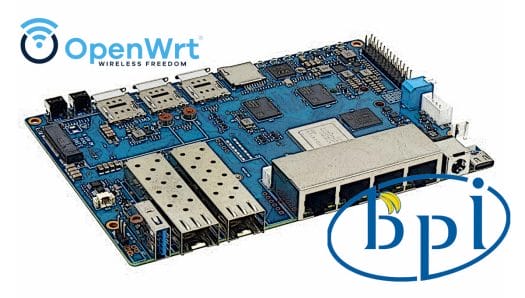

OpenWrt One/AP-24.XY is an upcoming router board developed by OpenWrt and Banana...
source link: https://www.cnx-software.com/2024/01/12/openwrt-one-ap-24-xy-router-board-openwrt-banana-pi/
Go to the source link to view the article. You can view the picture content, updated content and better typesetting reading experience. If the link is broken, please click the button below to view the snapshot at that time.

OpenWrt One/AP-24.XY is an upcoming router board developed by OpenWrt and Banana Pi
OpenWrt developers have started the process to develop the “OpenWrt One/AP-24.XY” router board based on MediaTek MT7981B (Filogic 820) SoC and MediaTek MT7976C dual-band WiFi 6 chipset, and designed in collaboration with Banana Pi that will also handle manufacturing and distribution of the router board.
As of the OpenWrt 23.05 release, close to 1,800 routers and other devices are officially supported by the lightweight embedded Linux operating system, and many more claim to be running OpenWrt through a fork of the OS. But none of those are made by OpenWrt developers who have now decided to create their own router board in collaboration with Banana Pi since they’ve done such boards including the BPI-R4 WiFi 7 router SBC.
For illustration only, not a rendering of the OpenWrt One/AP-24.XY board
OpenWrt One/AP-24.XY preliminary specifications:
- SoC – MediaTek MT7981B (Filogic 820) dual-core Cortex-A53 processor @ 1.3 GHz
- System Memory – 1GB DDR4
- Storage
- 128 MB SPI NAND flash for U-boot and Linux
- 4 MB SPI NOR flash for write-protected (by default) recovery bootloader (reflashing can be enabled with a jumper)
- Two types of flash devices are used to make the board almost unbrickable
- M.2 2042 socket for NVMe SSD (PCIe gen 2 x1) – Note: work-in-progress patch to make PCIe work inside the U-Boot bootloader to allow booting Linux distributions such as Debian and Alpine from the SSD.
- Networking
- 2.5GbE RJ45 port
- Gigabit Ethernet RJ45 port
- Dual-band WiFI 6 via MediaTek MT7976C (2×2 2.4 GHz + 3×3/2×2 + zero-wait DFS 5Ghz)
- 3x MMCX antenna connectors
- USB
- 1x USB 2.0 Type-A host port
- USB Type-C (device, console) port using Holtek HT42B534-2 UART to USB chip
- Expansion – MikroBUS socket for expansion modules
- Debugging – Console via USB-C port, 10-pin JTAG/SWD header for main SoC
- Misc
- Reset and User buttons
- Boot select switch: NAND (regular) or NOR (recovery)
- 2x PWM LEDs, 2x Ethernet LED (GPIO driven)
- EM6324 External hardware watchdog
- NXP PCF8563TS (I2C) RTC with battery backup holder for CR1220 coin-cell
- Power Supply
- 12V USB-PD on USB-C port
- Optional 802.3at/af PoE via RT5040 module
- Dimensions – 148 x 100.5 mm compatible with Banana Pi BPI-R4 case design
- Certifications – FCC/EC/RoHS compliance
The router’s specifications have been selected with the goal of keeping the price under $100, and that’s why we have interfaces such as USB 2.0 instead of USB 3.0 since there aren’t any spare ones in the Filogic 820 SoC. The schematics will be publicly available under an open-source license which has not been determined just yet, and as you might expect GPL compliance will be respected with “a complete machine-readable copy of the corresponding source code”.
OpenWrt developers selected Banana Pi because their existing boards have features closely matching what they’ve been wanting for several years, the company has become more popular with the OpenWrt community in recent years, and a lot of features are already supported in upstream/mainline U-Boot and Linux. The non-open-source components include the 2.5GbE PHY and WiFi firmware with blobs running on separate cores that are independent of the main SoC where OpenWrt is running. The DRAM calibration routines are closed-source binaries as well.
The OpenWrt One/AP-24.XY router should provide a source of income for the project, for example, to cover the cost of hosting and OpenWrt conferences, with Banana Pi selling the board through their distribution network, and for every device sold, donating to the Software Freedom Conservancy (SDC) with the funds earmarked for OpenWrt. The OpenWrt router board should be launched in 2024, but there’s no rETA for the project. More details may be found in the announcement.
Via Liliputing
Jean-Luc started CNX Software in 2010 as a part-time endeavor, before quitting his job as a software engineering manager, and starting to write daily news, and reviews full time later in 2011.
Recommend
About Joyk
Aggregate valuable and interesting links.
Joyk means Joy of geeK
